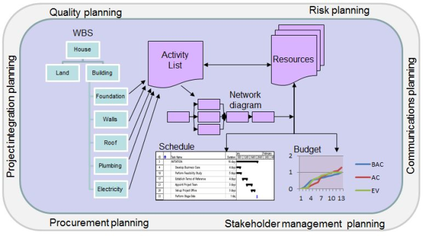Best Practice Project Management
This course is based on the principles of the PMBOK® Guide and aims to introduce new project managers to the best practices to be followed when managing projects. It is aimed at project practitioners with limited project management experience and those wanting to enter the project management environment.
Who Should attend?
Course Objectives |
To provide practical guidance and promote effective:
- Project selection and initiation.
- Stakeholder relationships and expectation management
- Scope statement, work breakdown structure, activity list and a project schedule network diagram creation.
- Estimating of the activity resources required, duration and cost for project activities.
- Establishing of the schedule, costs and scope baselines.
- Compilation of the quality, communication, risk and other related management plans.
- Documenting of the project roles, responsibilities, and reporting relationships.
- Directing and management of project execution.
- Acquiring, development and management of the project team.
- Management of project procurements.
- Development and management of an integrated change control system .
- Reporting on project performance.
- Closing the project.
Course content
1. Introduction and definitions (terms and definitions, project life cycles, portfolios, programs, projects, etc.)
2. Project Selection (project needs, objectives, requirements, etc.)
3. Project Stakeholders (project sponsor, project manager & other stakeholders)
4. Project initiation.( project statement of work, business case, project charter, etc.)
5. Project Planning
7. Monitoring and Control (tracking progress, determining variances, corrective actions, etc.)
8. Project or phase Close-out ( contractual close-out, procurement audits, administrative close-out, etc.)
2. Project Selection (project needs, objectives, requirements, etc.)
3. Project Stakeholders (project sponsor, project manager & other stakeholders)
4. Project initiation.( project statement of work, business case, project charter, etc.)
5. Project Planning
- Estimating Techniques (analogous, parametric, bottom-up, three-point, etc.)
- Project Scope Planning (scope & requirements management plans, requirements documentation, SOW, WBS, etc)
- Project Time Planning (schedule management plan, defining & sequencing activities, estimating, network & schedule, etc.)
- Project Cost Planning (cost management plan, estimating, budget, etc.)
- Project Quality Planning (quality management plan, standards, metrics, checklists, etc.)
- Project HR Planning (HR management plan, organization charts, role and responsibility descriptions, RAM, etc.)
- Project Communications Planning (communications management plan, requirements, technology, etc.)
- Project Risk Management Planning (risk appetite, tolerance, threshold, management plan, identification, analysis, prioritization, etc.)
- Project Procurement Planning (procurement management plan, source selection criteria, procurement documents, etc.)
- Project Stakeholder Management Planning (stakeholder management plan, stakeholder engagement assessment matrix, etc.)
- The Project Management Plan (baselines, management plans, tailoring, etc.)
7. Monitoring and Control (tracking progress, determining variances, corrective actions, etc.)
8. Project or phase Close-out ( contractual close-out, procurement audits, administrative close-out, etc.)
Course duration and material
This course can be done as either a five, four or three day class room event:
- 5 days (35 hours) of facilitator lead training for those delegates that want to gain a more thorough knowledge of the basic principles of project management. This course is ideal for delegates that have limited project experience as well as limited time available for self study. The course will cover the entire content of the delegate's manual, the most popular project management tools and techniques, as well as working through exercises and case studies in teams during the class.
- 4 days (28 hours) of facilitator lead training for those delegates that have a fair understanding and knowledge of the principles of project management as well as more time available for homework and self study. The classwork will cover all the basic project management principles, with case studies as teamwork during the class. Some of the exercises and project management tools and techniques will be covered during the class while delegates will be required to work through the remaining exercises and tools and techniques as homework.
- 3 days (21 hours) of facilitator lead training for those delegates that have a fair amount of project experience as well as a good knowledge of the basic principles of project management and are looking for a refresher course on the basic principles of project management. Case studies will be included as team work during the course, but delegates will be required to work through the majority of the exercises and tools and techniques as self-study.
- Student manuals are provided.

